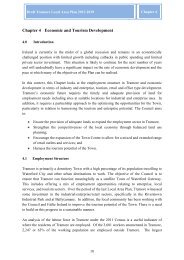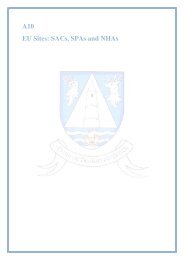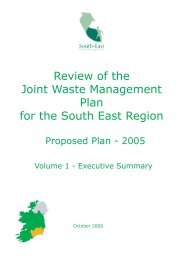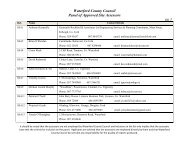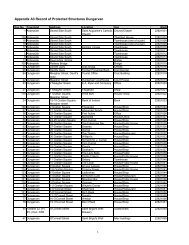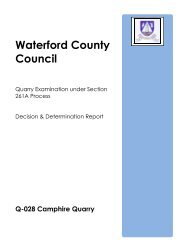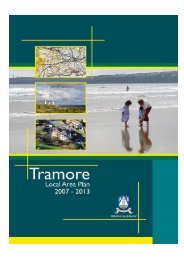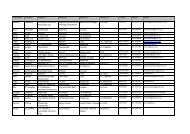Liquid Bio Fuel - Waterford County Council
Liquid Bio Fuel - Waterford County Council
Liquid Bio Fuel - Waterford County Council
Create successful ePaper yourself
Turn your PDF publications into a flip-book with our unique Google optimized e-Paper software.
<strong>Waterford</strong> Energy Bureau Renewable Energy Fact Sheet No.2<strong>Liquid</strong> <strong>Bio</strong> <strong>Fuel</strong>Introduction:Transport Issues: Transport uses almost 40% ofIrelands total final energy consumption and is thegreatest energy-consuming sector in the country.Virtually all transport vehicles in Ireland are poweredby fossil fuels (petrol or diesel). The combustion offossil fuels in vehicleengines emits greenhousegases and other airpollutants. Fossil fuelsare a finite resource andwill not last forever.Three Types of <strong>Liquid</strong> <strong>Bio</strong> <strong>Fuel</strong> Pure plant oil: vegetable oil (rapeseed, sunflower,palm, soy…) or waste cooking oil <strong>Bio</strong>diesel processed from vegetable oil, wastecooking oil or Tallow. <strong>Bio</strong>-ethanol can be made with sugar beet, sugarcane, cereals and wood residues or by wasteproducts of the dairy industryPure plant oil from rapeseed:Rapeseed is the most common form of <strong>Bio</strong> fuel inIreland and is grown as a brake crop typically onceevery three years of cereal growth.The major advantages of natural vegetable /rapeseed oil fuels are High energy density (practically equivalent tomineral diesel) <strong>Liquid</strong> in form and thus easy to handle Neither harmful toxic to humans, animals, soilnor water Neither flammable nor explosive, and does notrelease toxic gases It is recyclable form of energy. CO2 neutral when burning (does not contribute toglobal warming) Contains no sulphur (does not contribute to acidrain) Emits less soot than diesel when combusted Provides an income source for rural areas andsecures local fuel supplyConversion to run on Pure Plant OilVegetable oil is more viscous than mineral diesel andhas a high flash point. Therefore, some modificationsmaybe required to a diesel engine before it can befuelled by vegetable oil.The cost of converting a diesel vehicle to run on biofuel ranges from €690 to €1,700 depending upon themake and model of the vehicle andthe type of engine. Modified vehiclesdo not require any additionalmaintenance or servicing above thatof pre- conversion vehicles.Alternatively, bio fuel can be used asa blend with mineral diesel withoutthe requirement to modify certainengines. Blends of up to 50% arepossible in Ireland. The pay backperiod and on going economic benefits of running a vehicleon bio fuel is dependent upon the annual Kilometrestravelled of the vehicle. The bio fuel supplier will be ableto clarify which vehicles are compatible for the conversionto bio fuel or can operate on a bio fuel mix.Averagetravel ofprivateVehicle20,000km20,000kmFeasibility of converting vehicles to run on,<strong>Bio</strong> fuelAverage dieselconsumption of a newvehicle0.065 litres/km0.065 litres/kmTypical annual cost saving onconverting an vehicle to operate on<strong>Bio</strong>-fuel oil with an averagedistance travelled of 20, 000 km.Comparing Cost of <strong>Fuel</strong>s-1300/litres of diesel/annum @ acost of €1,500-1300/litres for bio fuel/annum@ a cost of € 975€ 525The payback period for converting the vehicle would bebetween 2 and 5 years.<strong>Bio</strong>diesel from oil (vegetable or waste cooking)Vegetable waste cooking oil or tallow can be convertedinto biodiesel to supply unmodified diesel engine:The Rapeseed Methyl Ester (RME)The Tallow Methyl Ester (TME)The Fat Acid Methyl Ester (FAME).Usually, the feedstock (oil or tallow) is mixed withmethanol for reaction, and then the products of reaction areglycerol and biodiesel (RME, TME or FAME). At the endof the process, the biodiesel may comply with theEuropean standards for biodiesel EN 14214 and mixes withmineral diesel standards EN 590 in order to allow blendingbetween the two fuels. The biodiesel price is approximately0.87 (€) per litre of pure biodiesel depending on the sourceto make it. There are actually three different blend rates ofuse for the biodiesel without engine modifications:(Manufacturer agreement is required for these)1
B05B30B100<strong>Bio</strong>diesel Blend5 % biodiesel30 % biodiesel100 % biodieseli.e. B20 means 20% biodiesel and 80% petroleum based dieselIn some cases you can start using biodieselimmediately without any modification. However it isrecommended to clarify this item with the vehiclemanufacturer. The running on biodiesel involvessome problems according to the type of vehicle;Accumulation of ester in the lubricating oil thatcan corrode any natural rubber parts in the fuellines.Inadequate low temperature properties lead tostarting difficulties and fuel filter blockagesduring winter.It is therefore recommend that you replace your fuelfilter after your first tank of biodiesel, since biodieselis a very good solvent and will scrub out all the tars,varnishes and gums left by fossil diesel in your fuelsystem. In order to limit these problems, the biodieselshould be filtered after esterification and before use;you should also check often the fuel filters of thevehicle and change them when needed.<strong>Bio</strong> Ethanol<strong>Bio</strong>ethanol is made when biomass is converted tosugars, which are then fermented into ethanol. Theprocess of hydrolysis separates most of the waterfrom ethanol, leaving an end product that is generallyabout 95% ethanol and 5% water.Ethanol can be also used in petrol engine in twodifferent ways:Petrol and ethanol blend (5% ethanol + 95%petrol) called E-5. This blend can supplyunmodified petrol engine.Ethanol and petrol blend (85% ethanol + 15%petrol) called E-85. This high ethanol contentblend requires an engine conversion.Note: the E-85 is available in some filling station inIreland, and the price is envisaged to beapproximately 15-20 cent per litre cheaper thanunleaded 95.Moreover, the conversion kit to run on E-85 costsaround € 660 to € 840 depending on the enginetechnology / size. A number of vehiclesmanufacturers sell cars that can directly run on E-85(bio-ethanol) which include Sabbs, Volvos and somemodels of Ford Focus.Licenses for bio-fuel generation plants for Motor Oil.Tax relief were issued within four distinct bio-fuelscategories and have a minimum production capacityas follows:<strong>Bio</strong>-fuel blend complying with EN590 (EuropeanDiesel Standards): the minimum project size is 10millions litres per year and the MOT relief wasgranted on five-year basis.<strong>Bio</strong>-ethanol: the minimum project size of 10 millionslitres per year.Pure Plant Oil: the minimum project size of 50thousands litres per year and the MOT relief wasgranted on a four-years basis.<strong>Bio</strong>-fuel used in identified Captive Fleet: the minimumproject size of 100 thousands litres per year.Companies that are licensed to produce liquid <strong>Bio</strong>-fuelCategoryCompanyVolumeAwarded forperiod 2006 -2010Cooley-Clearpower162 Clontarf Road, Dublin 354.38 m litresMaxol Ltd42.15 m litres3 Custom House Plaza, IFSC, Dublin 1<strong>Bio</strong>ethanolOne Fifty One Ltd176.07 m151 Thomas Street, Dublin 8litresTopaz Energy LtdTopaz House, Beechill Office Campus, 33.4 m litresClonskeagh, Dublin 4Conoco Philipps WhitegateRefinery Ltd93 m litresWhitegate, Midleton, Co Cork<strong>Bio</strong>diesel Production Ireland/<strong>Bio</strong>diesel - Topaz Energy Limited68 m litresEN590 Beech Hill Office Park, Clonskeagh,Dublin 4Green <strong>Bio</strong>fuels Ireland LtdBlackstoops, Enniscorthy, Co Wextford32 m litresIrish food processors Ltd14 Castle Street, Ardee, Co Louth97 m litres<strong>Bio</strong>green Energy products LtdThe Leap, Adamstown, Co Westford7 m litresPure PlantEilish Oils LtdKilmurry, Newtonmountkennedy, CoOilWicklow7 m litresGoldstar Oils LtdOldcourt, Inistioge, Co Kilkenny7 m litresGreyhound Recycling andRecovery LtdKnockmitten Lane, Western Industrial21.68 m litresEstate, Dublin 12Emo Oil LtdClonminam Industrial Estate, Portlaoise, 9.65 m litresCo LaoiseCaptiveEcoOlaFleetsInnovation in Business Centre, Galway 9.3 m litresMayo Institute of Technology, DublinRoad, GalwayEco <strong>Fuel</strong>s LtdCrohane, Fossa, Killarney, Co Kerry6.4 m litresBord na Mona PlcMain Street, Newbridge, Co Kildare0.58 m litres<strong>Waterford</strong> Energy Bureau is funded by;<strong>Waterford</strong> City <strong>County</strong> <strong>Council</strong>. This document wasdeveloped & printed in accordance with the Climate ChangeStrategies of both Local Authorities.<strong>Waterford</strong> Energy Bureau,Civic Offices, Tankfield, Tramore, Co. <strong>Waterford</strong>Phone No: 051-395530/395531 Fax No: 051-395520www.waterfordenergy.ie info@waterfordenergy.ie2




